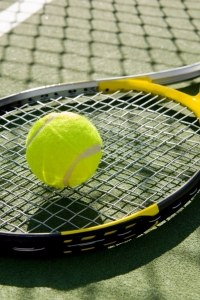
When I learnt that I was part of a consignment to India, my hope was that I would be bought by Leander Paes, Sania Mirza or Somdev Devvarman. Okay, maybe I was setting my expectations a little too high. Well then, let it be Yuki Bhambri, Ankita Bhambri or Rohan Bopanna. After all, I was fabricated in Head’s factory in Austria, and not just any random shop floor in China!
My destination was Shillong, a picturesque hill town. I was displayed in a sports store along with rackets belonging to the Wilson, Babolat, Prince, Dunlop and Volkl families. As we came to know each other, we exchanged stories about the factories we were made in, the quality control tests we were subjected to, the personalities of the workers on the assembly line and the pros who tested our various features on practice courts.
But we learnt about the harsh realities of life from the veterans who came to the store to be re-strung or get a grip changed. These veterans mentioned the mistreatment they and other rackets suffered at the hands, rather in the grips, of players. Some of them had been thrown on the ground by a frustrated player. Ouch, that hurt, they admitted. Some were flung into the net. That did not hurt as much. Some were repeatedly knocked by the players on their shoes, especially if the surface was clay. What indignity! We were proud warriors who should be treated with respect, not used as instruments to clear dirt from shoes.
After I had been on the racks for about seven months, I was selected by a man who wore glasses and had hair falling over his forehead in an untidy mop. He wore baggy pants. He must have been in his early thirties. Forget my dreams of being owned by professional players, even forget being owned by an athletic teenager; we, the voiceless ones, had no choice. I didn’t know what lay ahead.
A further blow to my ego: the man had the synthetic gut strung at 58 pounds. That meant that his style of play was spin rather than speed. I would have been proud to be strung at a higher tension; I knew I was a fighter meant to hit with power.
I was somewhat mollified when I heard him give me a name.
“Priya, you are my right hand. We’ll have a lot of fun together,” he said as laid me down gently on the back seat of his Maruti. ‘Priya’ means beloved.
I noticed that he had signed the credit card receipt with his left hand; the fact that he called me his right hand showed that he had a sense of humour. We drove to a college. He took his kit from the trunk of the car and went into the building. He came out a few minutes later wearing a light blue Adidas T-shirt and white shorts. He looked sprightly, transformed from the person in baggy pants who had come into the store.
He picked me up and walked round the building. Two tennis courts came into view. The first thing I did was to look at the surface. Thank God, it was not clay. At least I wouldn’t be used to knock the dust off his shoes. Three other players were already on the courts, hitting balls, warming up.
“Hey, Jai, you are late,” said one of the players. So my owner’s name was Jai. At least it was short and sweet. I hoped that the man would live up to his name, which stood for victory.
The others allowed Jai to warm up for a few minutes before they started playing a match. Jai’s partner was Dhruva Saikia.
None of the professionals who tested me for balance at the Head factory had been left handed. The sensation of being swung from the left side of the body was a new one for me. Not rough or jerky as I imagined left handed people to be, just different.
Jai hit the ball with care. He waited for the ball to hit the sweet spot. Dhruva on the other hand seemed to be in rush all the time. He hurried his shots which meant that his timing was not good. As a result Jai got most of the points for the duo.
After a while, Dhruva started muttering to himself. A while later he hit his racket, a Wilson, against his calf. When he did this the fourth time, I heard his racket say, “You paid money for me to do a job. You abuse me by not allowing me to do what I was created for. When you hit the ball off center, you jar me and you make me a failure. Yet I have no control over your lack of control.”
During the changeover between games, as the players sat on the bench and took sips from their water bottles, Dhruva’s racket turned to me and said, “I wish this guy was like your boss.”
“What do you mean?” I asked.
“Don’t you get a feeling of accomplishment when your boss hits the ball on center?”
I agreed, because that was exactly what I felt.
“The trouble with my guy is that when he hits a good shot, I get the sense that he believes that he is the reason for the solid shot.”
These guys switched partners after every set. Jai was partnered with a person named Gilbert Syiem in the next set.
Gilbert swung hard at every ball. A lot of his balls went out. In my opinion he should have been a cricketer hitting sixes.
Once when he missed a cross court drive he hit his racket three times on the top of the net, then glared at it.
His racket, a Babolat, muttered, loud enough for me to hear, “When you missed a ball, you stare at me as if it was my fault.”
In the third set, Jai’s partner was Badal Bhattacharjee. He was a very thin man with jerky movements. It seemed as if he was not sure in which direction he wanted to move. His favourite shot was the drop shot. When his drop shots went over the net, the opponents had little chance of even reaching the ball. Every time this happened, he tapped his racket on his head, gently. Most of the time though the ball went into the net; on such occasions he shook his racket in the direction of the net.
Every time he did this, his racket, also a Wilson, said, “So it seems that you are the reason for the good shots. The bad shots are my fault.”
When the three sets were over, Badal’s racket said, “Bottom line: I am not the reason that you win or lose. But I resent taking the blame and never getting any credit.”
Rackets have personalities too, just as men do!
The four players hung around the courts taking about the forthcoming exams. Except for Jai none of the others had even started work on the question papers
“See you Saturday here,” they said and went their own ways.
Jai placed me on the back seat with the same care he had done before.
I remembered a thought that one of the veterans had shared with me in the sports store. “The tennis court is a metaphor for life. The way a person treats a tennis racket on court is the way he will treat people who come into contact with him at work and home.” I contrasted Jai’s behaviour with the others; I gave him higher marks than the others.
When Jai parked the car, he carried me and his briefcase into the living room. His daughter heard him and came running out of her room shouting “papa, papa”. She was about six or seven years old. Jai picked her up, gently tossed her in the air and caught her round her waist, once, twice, thrice. The girl was bursting with laughter.
“Again, Papa, again.”
“No, Alka bitia. Papa is all sweaty. He’ll go for a shower.”
I did not notice that a woman in a salwar kameez stood at the entrance till she spoke.
“You have eyes – and time – only for your Alka bitia! What about the person who cooks and cleans for you?” The woman said this with a broad smile on her face. She wore rimless glasses, her shoulder-length hair was parted on the left.
“Wait, Bindiya. Your turn will come,” he said with a smile. “See, my new racket.”
He took me off his shoulder, unzipped the cover and held me out to Bindya. Bindya ran a hand round my frame.
“Did she help you win?”
I liked the feel of her hands; I’ll even go so far as to call it a caress.
Jai took me to a spare room at the back and hung me on a decorative hook on the wall. He left the door of the spare room open.
I could hear the rhythms of the house through the open door. At the dinner table all three talked and laughed a lot. Jai read a story to Alka and made her recite a prayer before tucking her into bed. Bindiya and Jai later sat talking in the living room. Again I heard a lot of laughter.
Jai played tennis twice a week, on Wednesday evenings and Saturday afternoons. His partners were mostly the lecturers and teachers from his college.
With time I was able to understand Jai’s game. Obviously, he had picked up the racket and taught himself to play tennis. So his technique was not as polished as the professionals at the factory who had tested me. I wish he would take a few lessons from a coach. That would improve his game a lot. Don’t get me wrong. He plays fairly well. His game plan is to keep returning the ball and let the other person make a mistake. He is steady and reliable and players enjoy partnering him. And I too enjoyed being his partner – remember, I was much closer to him than the others!
In my quiet way, I began to help his game. For one thing, he had an awkward grip: that meant that the strings were angled at 120 degree instead of 90. Gradually I would wiggle myself in his hand till the face was somewhat perpendicular. The perpendicular face made his shots land at his opponents’ feet and thus harder to return. Another of his flaws was that he was slow to swing his arm back. I would jerk it back a bit; that allowed the preparation for the stroke to be longer.
I had been Jai’s companion for a year now. The clear skies of Shillong and the playful winds of spring gave way to the heavy, continuous rains of summer. After the rains the trees and plants looked a sharper green. Autumn turned the green into brown. During the long winter, schools closed for three months and people moved to the plains of Assam and Kolkata.
Before people returned to the hills, Jay took me to the sports store to be re-strung. I was a veteran now. I saw the awe the newly minted rackets held us in.
When I was asked for my advice, I said, “Don’t dream of being bought by Leander Paes, Sania Mirza or Somdev Devvarman. Or even the lesser professionals. Just hope that the person who buys you does not take out his frustrations on you or abuses you in anyway. Pray that kindness is his second nature.”
About the Author





Comments